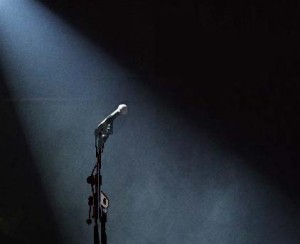 A poet came up to the open mic and told everyone he had just arrived from Los Angeles. He pulled out folded pieces of paper and began his rap on politics, life style and consumerism. The house was electrified. Many nodded in agreement and clapped enthusiastically when he finished. The poet was pleased, selected another piece of paper and recited another poem, in the same vein that dealt with the injustice, the hypocrisy, the blatant manipulations that are going on in our society. The house roared. He walked away from the mic a hero.
A poet came up to the open mic and told everyone he had just arrived from Los Angeles. He pulled out folded pieces of paper and began his rap on politics, life style and consumerism. The house was electrified. Many nodded in agreement and clapped enthusiastically when he finished. The poet was pleased, selected another piece of paper and recited another poem, in the same vein that dealt with the injustice, the hypocrisy, the blatant manipulations that are going on in our society. The house roared. He walked away from the mic a hero.
But the hero did not stay to be with the mass. He did not stay a minute longer to listen to the next poet. He opened the cafe door and walked out, shaking a few hands, much like a politician. If he had spoken the truth about the world, he had spoken the truth about himself.

tis easy to criticize.
Denunciations of our society are easy enough to make–there is a lot in our society that requires denouncing–but, unless the denouncer cops to some sort of complicity, they carry with them a strong egoistic element. The real subject of such screeds is not the society they are supposedly denouncing but the self-satisfaction one feels at being totally in the right. The “text” is the horrors of society–which everyone knows about–but the “subtext” is the ego gratification of the speaker. Such poems are popular for that reason: people applaud the people who speak them. The audience experiences the pleasure of hearing something they already agree with–so that their complacency isn’t challenged–and, in addition, experiences the deep pleasure of personal egotism. Hooray for me: look at the stand I’m taking. But such speeches change nothing and, indeed, don’t urge anyone to do anything: they are really an assertion of the status quo. As Yeats wrote once: “On, on, me darlin’ man.” A genuinely political writer such as Bertolt Brecht is interested in transformation, in arousing his audience to action–and he is willing to take the risk of saying the opposite of what he believes in order to stimulate his audience to contradict him. (Cf. the conclusion of the great opera, “Mahagonny.”) The person you heard was evidently interested in arousing his audience to only one action: the action of applauding him. And, alas, so they did. “On, on, me darlin’ man.”